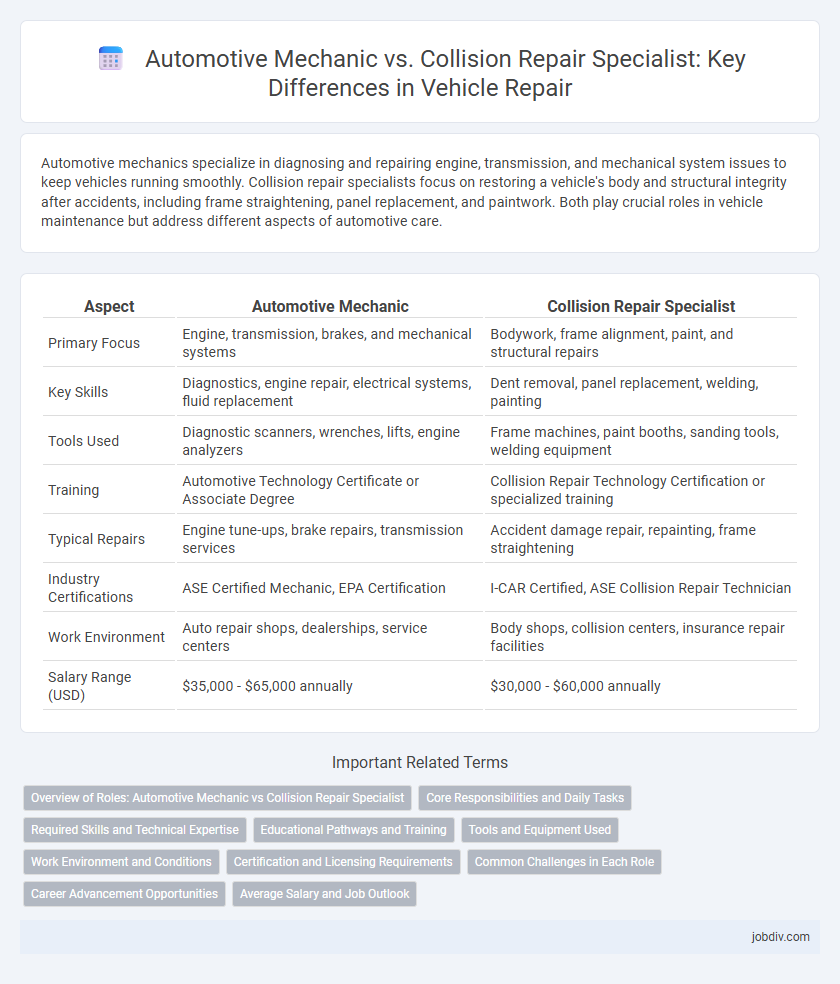Automotive mechanics specialize in diagnosing and repairing engine, transmission, and mechanical system issues to keep vehicles running smoothly. Collision repair specialists focus on restoring a vehicle's body and structural integrity after accidents, including frame straightening, panel replacement, and paintwork. Both play crucial roles in vehicle maintenance but address different aspects of automotive care.
Table of Comparison
| Aspect | Automotive Mechanic | Collision Repair Specialist |
|---|---|---|
| Primary Focus | Engine, transmission, brakes, and mechanical systems | Bodywork, frame alignment, paint, and structural repairs |
| Key Skills | Diagnostics, engine repair, electrical systems, fluid replacement | Dent removal, panel replacement, welding, painting |
| Tools Used | Diagnostic scanners, wrenches, lifts, engine analyzers | Frame machines, paint booths, sanding tools, welding equipment |
| Training | Automotive Technology Certificate or Associate Degree | Collision Repair Technology Certification or specialized training |
| Typical Repairs | Engine tune-ups, brake repairs, transmission services | Accident damage repair, repainting, frame straightening |
| Industry Certifications | ASE Certified Mechanic, EPA Certification | I-CAR Certified, ASE Collision Repair Technician |
| Work Environment | Auto repair shops, dealerships, service centers | Body shops, collision centers, insurance repair facilities |
| Salary Range (USD) | $35,000 - $65,000 annually | $30,000 - $60,000 annually |
Overview of Roles: Automotive Mechanic vs Collision Repair Specialist
An automotive mechanic focuses on diagnosing, maintaining, and repairing mechanical and electrical systems in vehicles, ensuring optimal performance and safety. A collision repair specialist specializes in restoring a vehicle's bodywork, addressing damage from accidents through tasks like dent removal, frame alignment, and paint matching. Both roles require technical expertise, but collision repair emphasizes structural and aesthetic restoration, whereas automotive mechanics prioritize functional vehicle systems.
Core Responsibilities and Daily Tasks
Automotive mechanics diagnose, maintain, and repair engines, transmissions, and other mechanical systems to ensure vehicle performance and safety. Collision repair specialists focus on restoring vehicle bodywork, including frame alignment, dent removal, and paint matching after accidents. Both professionals rely on diagnostic tools and technical expertise, but their core responsibilities differ in mechanical versus structural and cosmetic repairs.
Required Skills and Technical Expertise
Automotive mechanics require in-depth knowledge of engine diagnostics, electrical systems, and routine vehicle maintenance to ensure optimal performance and safety. Collision repair specialists specialize in structural alignment, paint matching, and bodywork techniques to restore vehicles after accidents. Both roles demand proficiency with advanced diagnostic tools and a strong understanding of automotive systems, yet collision repair requires additional skills in welding and refinishing technologies.
Educational Pathways and Training
Automotive mechanics typically complete technical diplomas or associate degrees focusing on engine repair, diagnostics, and maintenance, while collision repair specialists undergo specialized training in auto bodywork, painting, and structural damage restoration. Both careers often require certification from organizations like the National Institute for Automotive Service Excellence (ASE) or I-CAR for collision repair technicians to validate expertise and enhance employability. Training programs combine classroom instruction with hands-on experience in automotive technology or collision repair techniques to prepare students for industry demands.
Tools and Equipment Used
Automotive mechanics primarily use diagnostic scanners, engine analyzers, and lift machines to maintain and repair vehicle engines, brakes, and transmissions. Collision repair specialists rely on frame straightening machines, paint booths, and dent repair tools to restore vehicle bodies after accidents. Both professionals utilize air compressors, welding equipment, and specialized hand tools tailored to their specific repair tasks.
Work Environment and Conditions
Automotive mechanics typically work in clean, well-lit service bays with advanced diagnostic equipment, focusing on engine repairs, maintenance, and electronic systems. Collision repair specialists operate in more physically demanding environments such as body shops, where tasks include welding, sanding, and painting, often exposing workers to dust, fumes, and noise. Both professions require standing for long periods and adherence to safety protocols, but collision repair specialists face higher risks related to chemical exposure and manual labor intensity.
Certification and Licensing Requirements
Automotive mechanics typically require ASE (Automotive Service Excellence) certification to validate their skills in engine repair, diagnostics, and general vehicle maintenance, while collision repair specialists often pursue certifications from the I-CAR (Inter-Industry Conference on Auto Collision Repair) program to demonstrate expertise in structural repair and refinishing techniques. Licensing requirements vary by state but generally mandate that both professionals complete formal training programs and pass specialized exams to ensure compliance with safety and environmental regulations. Employers prioritize certified technicians to guarantee quality workmanship and adherence to industry standards.
Common Challenges in Each Role
Automotive mechanics frequently encounter challenges such as diagnosing complex engine and transmission issues, managing electronic system malfunctions, and keeping up with rapidly evolving automotive technologies. Collision repair specialists face difficulties including accurately assessing structural damage, restoring vehicle safety features like airbags and crumple zones, and matching paint colors to factory specifications for seamless finishes. Both roles demand continual training to cope with advancements in vehicle design and repair techniques, alongside pressures to deliver timely, high-quality service.
Career Advancement Opportunities
Automotive mechanics have diverse career advancement opportunities including specialization in engine diagnostics, transmission repair, or becoming service managers, with potential to work in dealerships or independent shops. Collision repair specialists can progress by mastering advanced paint technologies, frame straightening, and insurance claim handling, often moving into roles such as shop foreman or quality control inspectors. Both careers offer pathways to entrepreneurship, technical training instructor positions, and certifications like ASE that enhance job prospects and earning potential.
Average Salary and Job Outlook
Automotive mechanics earn an average salary of around $45,000 to $55,000 annually, with a steady job outlook driven by ongoing vehicle maintenance needs and advancements in automotive technology. Collision repair specialists typically have a comparable salary range, often between $40,000 and $60,000 per year, benefiting from increased demand due to rising vehicle accidents and insurance claims. Employment opportunities in both fields are projected to grow moderately, reflecting the sustained need for skilled professionals in vehicle repair and maintenance.
Automotive Mechanic vs Collision Repair Specialist Infographic

 jobdiv.com
jobdiv.com